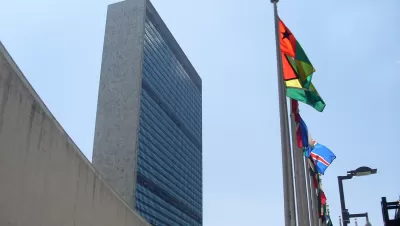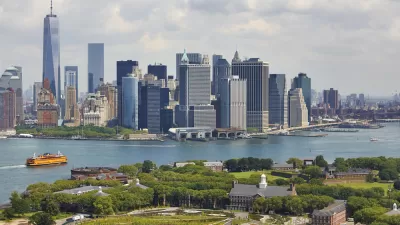The United Nations' ambitious set of goals have proven unwieldy, with some commentators saying they represent "all things to all people." Reorganizing and prioritizing them could help.

"No target left behind," was how one Gates Foundation employee described the UN's Sustainable Development Goals, according to this piece by Jeff Leitner and Tomicah Tillemann. Worldwide efforts to meet those guidelines by 2030, they write, are falling behind.
But there may be a way to revive the goals. "While this list of 17 goals and 169 targets is longer than the Constitution, it's not the goals' breadth, depth, or even ambition slowing us down; it's the absence of internal logic. The SDGs are a postmodern, deconstructed, Jackson Pollock-version of a to-do list."
The SDGs represent an attempt to engage stakeholders and focus groups, a noble thing to be sure. But trying to be all things to all people rarely works. "As a result, New America and the Organisation for Economic Co-operation and Development set out to solve this problem. They surveyed 85 developmental economists, political scientists, and social scientists around the world, asking them to put a cleaned-up list of 117 targets in the right order."
Leitner and Tillemann give us some of the leading steps:
1) promote the rule of law and access to justice; 2) eliminate the most extreme poverty; 3) ensure access to safe, effective, and affordable health care, medicine, and vaccines; 4) ensure women's right to economic opportunity, property ownership, and inheritance; 5) ensure government accountability and transparency
The authors also emphasize how profitable private investments in sync with the goals can mobilize some $85 trillion currently "parked in long-term investment vehicles" around the world.
FULL STORY: Why Are the United Nations' Sustainable Development Goals Stalling?

Maui's Vacation Rental Debate Turns Ugly
Verbal attacks, misinformation campaigns and fistfights plague a high-stakes debate to convert thousands of vacation rentals into long-term housing.

Planetizen Federal Action Tracker
A weekly monitor of how Trump’s orders and actions are impacting planners and planning in America.

In Urban Planning, AI Prompting Could be the New Design Thinking
Creativity has long been key to great urban design. What if we see AI as our new creative partner?

King County Supportive Housing Program Offers Hope for Unhoused Residents
The county is taking a ‘Housing First’ approach that prioritizes getting people into housing, then offering wraparound supportive services.

Researchers Use AI to Get Clearer Picture of US Housing
Analysts are using artificial intelligence to supercharge their research by allowing them to comb through data faster. Though these AI tools can be error prone, they save time and housing researchers are optimistic about the future.

Making Shared Micromobility More Inclusive
Cities and shared mobility system operators can do more to include people with disabilities in planning and operations, per a new report.
Urban Design for Planners 1: Software Tools
This six-course series explores essential urban design concepts using open source software and equips planners with the tools they need to participate fully in the urban design process.
Planning for Universal Design
Learn the tools for implementing Universal Design in planning regulations.
planning NEXT
Appalachian Highlands Housing Partners
Mpact (founded as Rail~Volution)
City of Camden Redevelopment Agency
City of Astoria
City of Portland
City of Laramie




























